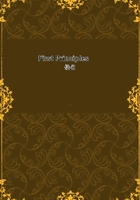
第28章
Similarly if we go back to the manufacture of the gun. By relations of co-existencebetween colour, density, and place in the earth, a particular mineral isknown as one which yields iron; and the obtainment of iron from it, resultswhen certain correlated acts of ours are adjusted to certain correlated affinitiesdisplayed by ironstone, coal, and lime, at a high temperature. If we descendyet a step further, and ask a chemist to explain the explosion of gunpowder,or apply to a mathematician for a theory of projectiles, we still find thatspecial or general relations of co-existence and sequence among properties,motions, spaces, etc., are all they can teach us. And lastly, let it be notedthat what we call truth guiding us to successful action and consequent maintenanceof life, is simply the accurate correspondence of subjective to objectiverelations; while error, leading to failure and therefore towards death, isthe absence of such accurate correspondence.
If, then, Life, as knowable by us, inclusive of Intelligence in its highestforms, consists in the continuous adjustment of internal relations to externalrelations, the relative character of our knowledge is necessarily implied.
The simplest cognition being the establishment of some connexion betweensubjective states, answering to some connexion between objective agencies;and each successively more complex cognition being the establishment of somemore involved connexion of such states, answering to some more involved connexionof such agencies; it is clear that the process, no matter how far it be carried,can never bring within the reach of Intelligence, either the states themselvesor the agencies themselves. Ascertaining which things occur along with which,and what things follow what, supposing it to be pursued exhaustively muststill leave us with co-existences and sequences only. If every act of knowingis the formation of a relation in consciousness answering to a relation inthe environment, then the relativity of knowledge is self-evident -- becomesindeed a truism. Thinking being relationing, no thought can ever expressmore than relations.
And here let us note how that to which our intelligence is confined, isthat with which alone our intelligence is concerned. The knowledge withinour reach is the only knowledge that can be of service to us. This maintenanceof a correspondence between internal actions and external act ions, merelyrequires that the agencies acting upon us shall be known in their co-existencesand sequences, and not that they shall be known in themselves. If x and yare two uniformly connected properties in some outer object, while a andb are the effects they produce in our consciousness, then the sole need isthat a and b and the relation between them, shall always answer to x andy and the relation between them. It matters nothing to us if a and b arelike x and y or not. Could they be identical with them, we should not beone whit the better off; and their total dissimilarity is no disadvantage.
Deep down then in the very nature of Life, the relativity of our knowledgeis discernible. The analysis of vital actions in general, leads not onlyto the conclusion that things in themselves cannot be known to us, but alsoto the conclusion that knowledge of them, were it possible, would be useless. §26. There remains the final question -- What must we say concerningthat which transcends knowledge? Are we to rest wholly in the consciousnessof phenomena? Is the result of inquiry to exclude utterly from our mindseverything but the relative? or must we also believe in something beyondthe relative?
The answer of pure logic is held to be that by the limits of our intelligencewe are rigorously confined within the relative, and that anything transcendingthe relative can be thought of as a pure negation, or as a non-existence.
"The absolute is conceived merely by a negation of conceivability"writes Sir William Hamilton. "The Absolute and the Infinite," saysMr. Mansel, "are thus, like the Inconceivable and the Imperceptible,names indicating, not an object of thought or of consciousness at all, butthe mere absence of the conditions under which consciousness is possible."So that since reason cannot warrant us in affirming the positive existenceof that which is cognizable only as a negation, we cannot rationally affirmthe positive existence of anything beyond phenomena.
Unavoidable as this conclusion seems, it involves, I think, a grave error.
If the premiss be granted the inference must be admitted; but the premiss,in the form presented by Sir William Hamilton and Mr. Mansel, is not strictlytrue. Though, in the foregoing pages, the arguments used by these writersto show that the Absolute is unknowable, have been approvingly quoted; andthough these arguments have been enforced by others equally thoroughgoing;yet there remains to be stated a qualification which saves us from the scepticismotherwise necessitated. It is not to be denied that so long as we confineourselves to the purely logical aspect of the question, the propositionsquoted above must be accepted in their entirety; but when we contemplateits more general, or psychological, aspect, we find that these propositionsare imperfect statements of the truth: omitting, or rather excluding, asthey do, an all-important fact. To speak specifically: -- Besides that definiteconsciousness of which Logic formulates the laws, there is also an indefiniteconsciousness which cannot be formulated. Besides complete thoughts, andbesides the thoughts which though incomplete admit of completion, there arethoughts which it is impossible to complete; and yet which are still real,in the sense that they are normal affections of the intellect.